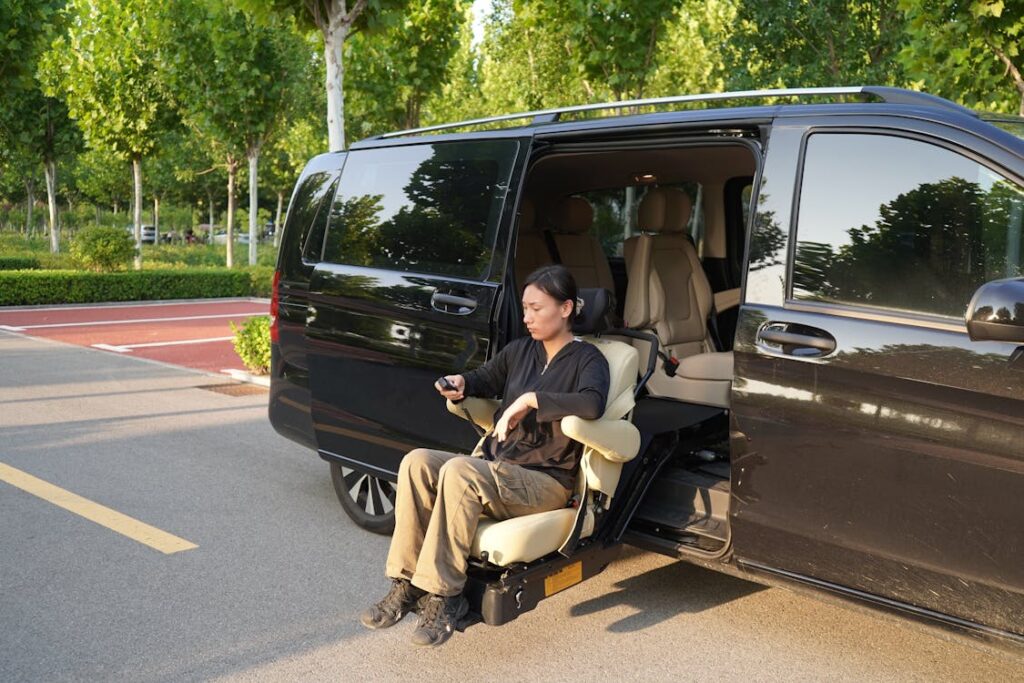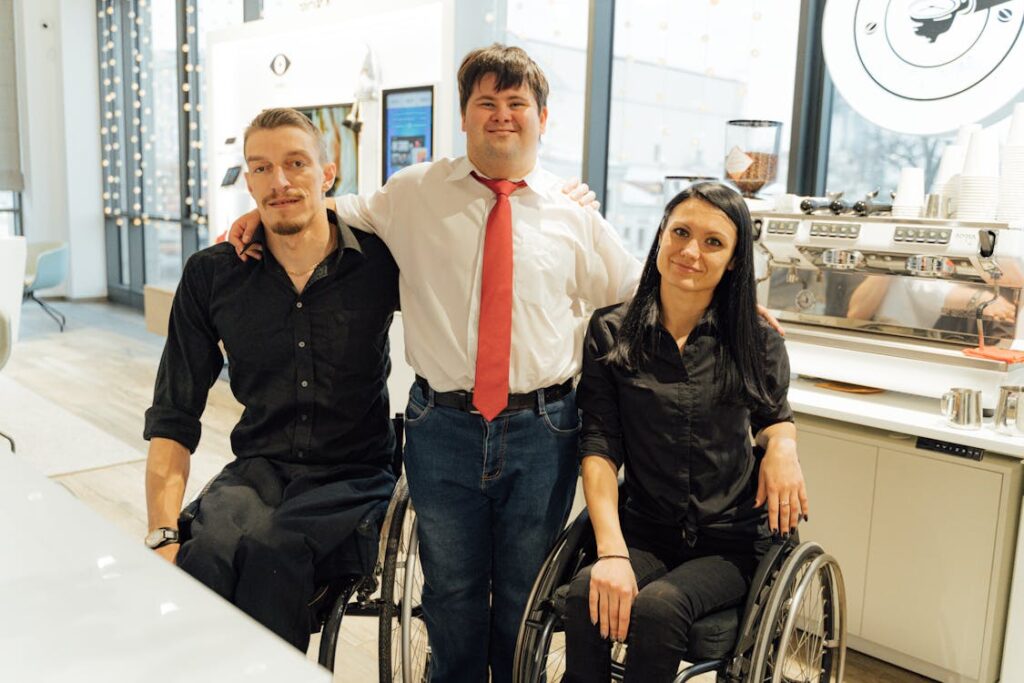People with disabilities in India have legal rights that protect them from discrimination and ensure equal opportunities. However, having laws on paper is not enough. Real change happens when these laws are enforced, and institutions are held accountable. This is where the Chief Commissioner for Persons with Disabilities (CCPD) plays a crucial role.
The CCPD is the highest authority in India responsible for monitoring and enforcing disability rights. This office ensures that government bodies, private institutions, and society as a whole follow the laws that protect people with disabilities. From investigating complaints to advising policymakers, the Chief Commissioner has the power to push for real improvements in accessibility, employment, education, and overall social inclusion.
Many people with disabilities and their families are unaware of how the CCPD can help them. Understanding its role, powers, and how to file a complaint can be life-changing.

Understanding the Role of the Chief Commissioner for Persons with Disabilities
The Chief Commissioner for Persons with Disabilities (CCPD) is responsible for ensuring that the rights of people with disabilities are protected and that government institutions and private organizations comply with disability laws.
This office was created under the Rights of Persons with Disabilities (RPWD) Act, 2016, which strengthened legal protections for people with disabilities in India. The CCPD serves as a watchdog, making sure that laws are followed and that complaints from individuals are addressed.
The Powers and Responsibilities of the CCPD
The Chief Commissioner has the authority to investigate cases where disability rights are violated.
If a government office, employer, educational institution, or public service provider fails to follow accessibility standards or discriminates against a person with a disability, the CCPD can step in.
It has the power to summon officials, demand reports, and recommend corrective action. In serious cases, the CCPD can refer matters to the courts for legal enforcement.
Another key role of the CCPD is to monitor policy implementation. Many disability laws exist in India, but enforcement is often weak.
The Chief Commissioner ensures that government agencies follow through on their commitments to accessibility, employment quotas, inclusive education, and healthcare services for people with disabilities.
The office also works with state governments, as each state has its own Commissioner for Disabilities who handles local cases.
The CCPD also provides advice to the government on policies and programs related to disability rights.
Whether it is the design of public transport, employment policies, or education reforms, the Chief Commissioner plays an important role in shaping decisions that impact millions of people.
Filing a Complaint with the Chief Commissioner
If a person with a disability faces discrimination, denial of rights, or inaccessibility in public services, they can file a complaint with the CCPD. This is one of the most important functions of the office, as it gives individuals a way to seek justice when their rights are violated.
Complaints can be made against government departments, employers, hospitals, schools, banks, and other institutions that fail to comply with the RPWD Act.
For example, if a company refuses to hire a qualified person because of their disability, or if a university does not provide necessary accommodations, the CCPD can investigate and take action.
To file a complaint, an individual or their representative can submit details online or in writing to the CCPD’s office. They must describe the issue, provide supporting evidence, and mention any previous attempts to resolve the matter.
Once the complaint is received, the CCPD reviews it and decides whether an investigation is necessary. If the issue falls under the jurisdiction of a State Commissioner for Disabilities, the case is forwarded to the relevant state authority.
The Impact of the CCPD on Disability Rights in India
Over the years, the CCPD has played a crucial role in bringing about systemic changes.
Many landmark cases have been resolved through its intervention, leading to improved accessibility in public spaces, stronger enforcement of employment quotas, and better accommodations in educational institutions.
However, challenges remain. Many people are still unaware of their rights, and some institutions fail to act even after the CCPD issues recommendations.
This makes continued legal awareness and advocacy essential for ensuring that disability rights are not just recognized in law but implemented in practice.

How the Chief Commissioner Enforces Disability Rights
The effectiveness of the Chief Commissioner for Persons with Disabilities (CCPD) lies in its ability to enforce the Rights of Persons with Disabilities (RPWD) Act, 2016.
While the law provides strong protections, it is the CCPD’s responsibility to ensure these protections translate into real-world improvements.
The enforcement process involves conducting investigations, issuing directives, recommending penalties, and following up with government agencies and private organizations to ensure compliance.
Investigations and Hearings
When a complaint is filed, the CCPD first reviews the case to determine whether there is a valid violation of disability rights.
If the complaint is serious, the office may summon the concerned parties, including government officials, employers, or service providers, for an official hearing. These hearings allow both sides to present their arguments, and the CCPD makes a decision based on the law.
One of the strongest powers of the CCPD is its ability to conduct on-site inspections. If a government office claims that it is accessible but individuals report otherwise, the Chief Commissioner’s office can visit the premises to verify the conditions.
This has been crucial in exposing false claims of accessibility and forcing institutions to make necessary changes.
Issuing Directives and Recommendations
After reviewing a case, the CCPD has the authority to issue directives requiring immediate action. These can include:
- Ordering a public or private institution to implement accessibility modifications
- Directing an employer to reinstate an individual if they were wrongfully dismissed due to a disability
- Recommending compensation for a person whose rights have been violated
- Pushing for systemic reforms in policies that affect multiple people with disabilities
While the CCPD does not have the power to impose legal penalties, it can escalate serious violations to higher authorities, such as the Ministry of Social Justice and Empowerment, the judiciary, or the National Human Rights Commission.
In some cases, the Chief Commissioner may also recommend changes to laws or regulations to prevent future violations.
Ensuring Compliance from Government Agencies
Government agencies are required to follow disability laws, but enforcement is often weak. The CCPD plays a key role in holding them accountable.
If a government department fails to implement the 4% employment reservation for persons with disabilities, the Chief Commissioner can demand an explanation and insist that the quota is met.
Similarly, if a state government does not allocate funds for disability welfare programs, the CCPD can intervene and push for corrective action.
The office also conducts regular accessibility audits of public buildings, transport systems, and workplaces to ensure they meet legal standards.
These audits have led to improvements in railway stations, airports, and government offices across India, though much work remains to be done.
Collaboration with State Commissioners
While the CCPD operates at the national level, each Indian state has its own State Commissioner for Persons with Disabilities. These state-level authorities handle local cases and work under the guidance of the Chief Commissioner.
If a complaint is filed at the central level but falls under state jurisdiction, the CCPD forwards it to the relevant State Commissioner while monitoring progress.
This structure ensures that disability rights enforcement is not just centralized in Delhi but reaches people across the country.
However, not all states enforce disability laws equally, making the role of the Chief Commissioner even more critical in ensuring uniform compliance nationwide.
The Challenges of Enforcement
Despite the powers granted to the CCPD, enforcing disability rights in India comes with significant challenges. Many institutions ignore directives, and penalties for non-compliance are often weak.
Legal processes can be slow, making it difficult for individuals to see quick resolutions to their complaints.
Moreover, lack of awareness remains a major issue. Many people with disabilities do not know that they can approach the CCPD when their rights are violated.
Greater outreach and awareness campaigns are needed to ensure that more individuals can benefit from the protections offered by the law.

Strengthening Accessibility and Inclusion Through the CCPD
One of the most critical functions of the Chief Commissioner for Persons with Disabilities (CCPD) is ensuring accessibility in public spaces, workplaces, and services.
Despite clear legal mandates, many government offices, transport systems, and businesses in India still lack essential accessibility features such as ramps, elevators, tactile pathways, and assistive technologies.
The CCPD actively intervenes to hold authorities accountable and push for meaningful improvements.
Ensuring Accessibility in Public Spaces
Public infrastructure should be designed to accommodate people with disabilities, yet many government buildings, railway stations, and even hospitals remain inaccessible.
When complaints are filed, the CCPD conducts investigations and orders corrective action. In many cases, the intervention of the CCPD has led to improvements in accessibility, forcing organizations to comply with legal standards.
For instance, after multiple complaints about inaccessibility at railway stations, the CCPD directed Indian Railways to install ramps, accessible ticket counters, and designated spaces for wheelchair users in trains.
Similarly, complaints about inaccessible government offices have led to direct orders for structural modifications, ensuring that people with disabilities can access essential services without unnecessary hardship.
The Accessible India Campaign, launched in 2015, aimed to improve accessibility in public buildings, transportation, and digital services. The CCPD plays a key role in monitoring its implementation, ensuring that state and central government bodies follow the guidelines.
When authorities fail to meet their commitments, the CCPD can intervene and demand action.
Protecting Employment Rights for People with Disabilities
The right to work is essential for dignity and independence. The RPWD Act, 2016 mandates a 4% reservation for people with disabilities in government jobs and promotes inclusive hiring in the private sector.
However, discrimination in hiring and workplace accessibility remains a major issue. Many employers still refuse to accommodate employees with disabilities, failing to provide accessible workspaces, assistive technologies, or necessary modifications.
The CCPD plays a vital role in ensuring that people with disabilities are not denied job opportunities due to bias or inaccessibility. It investigates cases where employers fail to implement disability reservations or discriminate in hiring.
Several legal cases brought before the CCPD have led to companies and government offices being ordered to reinstate employees or provide necessary workplace accommodations.
Another important aspect is career advancement. Many employees with disabilities face barriers when it comes to promotions and leadership positions.
The CCPD ensures that disabled employees are given equal opportunities to grow in their careers, pushing for fair policies and better workplace conditions.
Enforcing Inclusive Education Policies
Education is a fundamental right, yet many schools, colleges, and universities in India fail to provide an inclusive learning environment. Many students with disabilities struggle due to inaccessible classrooms, lack of special educators, and absence of assistive learning materials.
The CCPD has taken action against institutions that fail to comply with accessibility norms and has pushed for better enforcement of policies like the Sarva Shiksha Abhiyan and the National Education Policy.
In cases where students have been denied admission or reasonable accommodations, the CCPD has intervened to ensure justice.
Many universities have had to modify their policies after being directed by the Chief Commissioner’s office, setting an important precedent for inclusivity in education.

Addressing Discrimination and Legal Violations
Despite strong legal protections, people with disabilities in India continue to face discrimination in many aspects of life.
Whether it is being denied admission to a school, facing unfair treatment at the workplace, or struggling to access healthcare, violations of disability rights are common.
The Chief Commissioner for Persons with Disabilities (CCPD) plays a key role in addressing complaints, investigating violations, and ensuring that justice is served.
Investigating and Resolving Disability Rights Violations
One of the main responsibilities of the CCPD is handling complaints related to disability rights violations. When an individual or advocacy group files a complaint, the CCPD has the authority to investigate the issue.
If a violation is found, the CCPD can direct the responsible authorities—whether government offices, private organizations, or educational institutions—to take corrective action.
For example, in cases where schools or colleges deny admission to students with disabilities, the CCPD can order the institution to reverse their decision and provide necessary accommodations.
Similarly, if a company refuses to hire a qualified candidate due to their disability, the CCPD can step in and ensure that the candidate is given a fair opportunity.
Holding Government Departments Accountable
While many disability rights violations occur in private organizations, government institutions are also guilty of failing to implement accessibility and inclusion policies.
The CCPD has the authority to summon officials, request reports, and demand explanations from government departments that fail to comply with the Rights of Persons with Disabilities (RPWD) Act, 2016.
For instance, if a state government fails to implement the mandatory 4% reservation for persons with disabilities in public sector jobs, the CCPD can intervene and demand action.
In some cases, the CCPD has forced state governments to issue revised recruitment notifications that ensure fair representation of people with disabilities.
Strengthening Legal Protections for People with Disabilities
Apart from resolving individual cases, the CCPD also works on a larger level to strengthen legal frameworks and policies that protect people with disabilities.
The Chief Commissioner’s office provides recommendations to the central and state governments on how to improve disability laws and ensure better implementation.
For example, when issues regarding the delayed issuance of disability certificates were raised, the CCPD recommended that state governments simplify the certification process and introduce digital applications.
This led to improvements in how disability documentation is provided, making it easier for individuals to access their rights without unnecessary bureaucracy.
The CCPD also works closely with courts to provide expert opinions in cases related to disability rights.
Many important disability rights cases in the Supreme Court and High Courts have benefited from the Chief Commissioner’s input, ensuring that legal decisions are made with a strong understanding of disability laws and their impact.
Promoting Awareness and Advocacy
One of the biggest challenges in enforcing disability rights is lack of awareness. Many people with disabilities and their families do not know that they can file complaints with the CCPD when their rights are violated.
The Chief Commissioner’s office conducts awareness campaigns, training programs, and outreach activities to educate people about their rights and the legal protections available to them.
Workshops are held for government officials, educators, healthcare providers, and employers to help them understand their responsibilities under disability laws.
These initiatives aim to create a society where accessibility and inclusion are not just legal obligations but a natural part of how institutions function.

The CCPD’s Role in Advancing Assistive Technology and Innovation
Technology has the power to transform the lives of people with disabilities, making everyday tasks easier and increasing independence.
From advanced prosthetics and mobility aids to smart home solutions and AI-powered assistive tools, innovation is changing how disability inclusion is approached.
The Chief Commissioner for Persons with Disabilities (CCPD) plays a key role in ensuring that people with disabilities have access to these technologies and that businesses and institutions integrate them into their services.
Encouraging the Use of Assistive Technology in Public and Private Sectors
The CCPD actively promotes the use of assistive technologies in workplaces, educational institutions, and public infrastructure.
Many government offices and private companies have been slow to adopt disability-friendly technologies, such as screen readers, braille displays, speech-to-text software, and AI-powered navigation tools.
When complaints are raised about a lack of assistive technology in public services, the CCPD intervenes to push for necessary changes.
For example, in cases where government websites were not accessible to visually impaired users, the CCPD directed authorities to redesign their platforms to comply with the Web Content Accessibility Guidelines (WCAG).
Similar interventions have been made in banking services, where many ATMs and mobile banking apps were previously inaccessible to people with disabilities.
Promoting Research and Development in Disability-Friendly Technology
The CCPD works with research institutions, universities, and technology companies to encourage the development of innovative assistive devices.
This includes supporting advancements in bionic limbs, advanced wheelchairs, speech synthesis software, and neuroprosthetics. By advocating for investment in this sector, the CCPD ensures that India remains at the forefront of disability-focused innovation.
One major initiative has been the push for affordable prosthetic solutions. Many assistive devices are expensive, making them inaccessible to a large portion of the disabled population.
The CCPD works with government agencies and disability rights organizations to subsidize or reduce the cost of these technologies, ensuring that more people can benefit from them.
Ensuring Digital Accessibility and Smart City Integration
With India’s rapid urbanization and the development of Smart Cities, the CCPD has been instrumental in ensuring that new urban projects are designed with accessibility in mind.
This includes smart traffic signals for visually impaired pedestrians, automated public transport announcements, and sensor-based wheelchair accessibility features.
As digital services become essential in daily life, the CCPD is also pushing for better accessibility in online education, telemedicine, and digital banking.
Many court rulings regarding digital accessibility have come after complaints filed with the CCPD, highlighting its role in shaping the future of disability-friendly digital policies.
Strengthening the Legal Framework for Disability Rights
While the Chief Commissioner for Persons with Disabilities (CCPD) plays a critical role in enforcing existing laws, it also works to strengthen and expand the legal framework protecting people with disabilities.
Many legal provisions exist in India, but gaps in implementation and enforcement mean that rights are often denied. The CCPD is instrumental in identifying weaknesses in current laws and recommending policy changes to improve disability inclusion.
Pushing for Stronger Implementation of the RPWD Act, 2016
The Rights of Persons with Disabilities (RPWD) Act, 2016 is India’s most comprehensive law protecting disability rights.
It mandates accessibility in public spaces, a 4% reservation in government jobs, inclusive education, and protection from discrimination. However, many provisions of this law remain unimplemented at the state level due to a lack of awareness, funding, and accountability.
The CCPD plays a crucial role in monitoring compliance with the RPWD Act. It regularly reviews government policies, conducts audits of public infrastructure, and ensures that states fulfill their legal obligations.
If violations occur, the CCPD can issue notices, demand corrective measures, and recommend penalties for non-compliance.
For example, when certain state governments failed to implement job reservations for persons with disabilities, the CCPD intervened, leading to policy revisions and increased hiring of disabled candidates in government offices.
Advocating for Legal Reforms and Policy Updates
The world is changing, and so are the needs of people with disabilities. The CCPD works with lawmakers, disability rights organizations, and legal experts to recommend reforms that keep India’s disability laws up to date.
Whether it is advocating for better social security benefits, stronger anti-discrimination measures, or improved healthcare access, the CCPD ensures that the legal system evolves to meet modern challenges.
One key area of focus has been accessible transport laws. Public transportation in India still lacks full accessibility, with many buses, metro systems, and railway stations failing to accommodate people with disabilities.
Following complaints and petitions, the CCPD has pushed for stricter enforcement of accessibility standards in public transport projects, leading to gradual improvements in infrastructure.
Ensuring Justice Through Legal Intervention
When people with disabilities face injustice—such as denial of employment, forced eviction, or discrimination—the CCPD acts as a legal ally.
It can intervene in cases before the courts, provide legal opinions, and support petitioners fighting for their rights. Many Supreme Court and High Court rulings on disability rights have been influenced by recommendations and reports from the CCPD.
For example, in cases where students with disabilities were denied reasonable accommodations in competitive exams, the CCPD stepped in to advocate for extended exam durations, accessible test centers, and the provision of scribes.
Such interventions have set legal precedents that continue to benefit people with disabilities across the country.
The CCPD’s role in shaping and enforcing legal protections cannot be overstated. It acts as a bridge between the law and the lived experiences of people with disabilities, ensuring that legal protections are not just symbolic but actively enforced.

The Future of Disability Rights in India: The Role of the CCPD
While significant progress has been made in enforcing disability rights in India, challenges remain.
The Chief Commissioner for Persons with Disabilities (CCPD) will continue to play a crucial role in ensuring that people with disabilities receive equal opportunities and full participation in society.
Looking ahead, several key areas will require stronger intervention and advocacy to create a truly inclusive India.
Strengthening State-Level Implementation
While the CCPD operates at the national level, each Indian state has its own State Commissioner for Persons with Disabilities responsible for handling local complaints and ensuring accessibility.
However, in many states, enforcement is weak, and progress is slow. Some state offices lack proper funding and staffing, making it difficult to monitor compliance effectively.
To bridge this gap, the CCPD must continue to push state governments to prioritize disability rights.
This includes ensuring that all state disability commissioners are fully empowered, that they conduct regular audits of public and private institutions, and that they impose penalties for non-compliance with the Rights of Persons with Disabilities (RPWD) Act, 2016.
Expanding Awareness and Outreach Programs
One of the biggest challenges in enforcing disability rights is that many people with disabilities and their families do not know their rights or how to seek help.
While the CCPD provides a legal avenue for justice, it can only be effective if people are aware of its existence and functions.
Expanding public awareness campaigns, legal literacy programs, and outreach initiatives will be crucial.
The CCPD can collaborate with disability rights organizations, NGOs, and media outlets to educate people about how to file complaints, demand accessibility improvements, and fight discrimination.
Encouraging Disability-Inclusive Economic Growth
The economic empowerment of people with disabilities remains a critical issue. While legal mandates exist for job reservations in the government sector, employment opportunities in the private sector are still limited.
Many companies are unaware of the benefits of hiring people with disabilities, and workplace accommodations are often neglected.
The CCPD can play a significant role in promoting corporate inclusivity by working with businesses to implement better hiring policies, offer financial incentives for disability-friendly workplaces, and encourage skill development programs for people with disabilities.
Pushing for More Technological Advancements
With the rapid development of assistive technologies, AI-driven accessibility solutions, and smart city innovations, the future of disability inclusion in India depends on how well these technologies are integrated into daily life.
The CCPD can advocate for stronger government investment in assistive technology, more funding for disability research, and mandatory accessibility standards for all digital platforms.
For example, as India moves toward a cashless economy, it is crucial that digital banking services are fully accessible to people with visual impairments and other disabilities. The CCPD’s intervention in such matters will ensure that no one is left behind in the digital revolution.
A Future of Full Inclusion
The Chief Commissioner for Persons with Disabilities (CCPD) remains one of the most powerful institutions protecting disability rights in India.
From fighting discrimination and enforcing accessibility laws to shaping future policies and promoting innovation, its role is indispensable.
The road ahead requires continued vigilance, advocacy, and enforcement. The more people with disabilities are aware of their rights and seek action, the stronger the impact of the CCPD will be.
Together, through legal interventions, awareness, and technology-driven solutions, India can build a society where disability rights are not just respected on paper but actively upheld in everyday life.
Conclusion
The Chief Commissioner for Persons with Disabilities (CCPD) plays a vital role in enforcing disability rights in India. From ensuring accessibility in public spaces and workplaces to handling discrimination complaints and advising the government on policy reforms, the CCPD is a key institution driving inclusion and equality. Its interventions have led to significant improvements in education, employment, healthcare, and digital accessibility for people with disabilities.
However, challenges remain. Many laws, including the Rights of Persons with Disabilities (RPWD) Act, 2016, are not fully implemented at the state level, and awareness about legal rights is still lacking. Stronger enforcement, better coordination with state disability commissioners, and wider public outreach are essential to making disability rights a reality for all.
The future of disability rights in India depends on continuous advocacy, technological advancements, and proactive governance. By ensuring that policies are enforced, companies adopt inclusive hiring practices, and public infrastructure is accessible, India can move closer to true equality.
If you or someone you know is looking for assistive technology solutions, Robobionics is here to help. Contact us today to explore innovative prosthetic solutions designed to empower independence and mobility!



